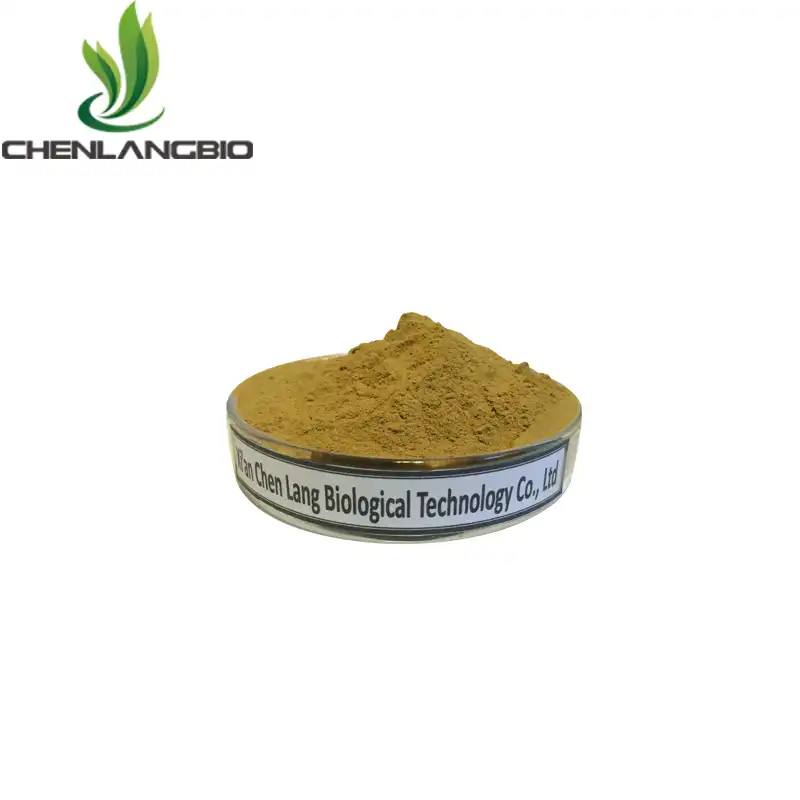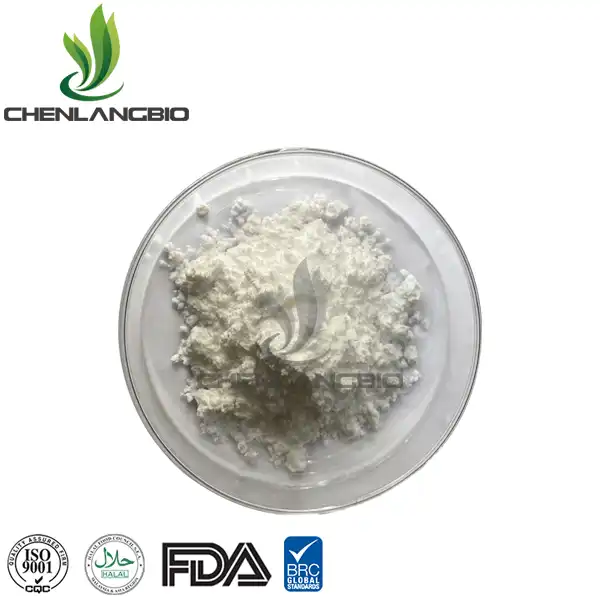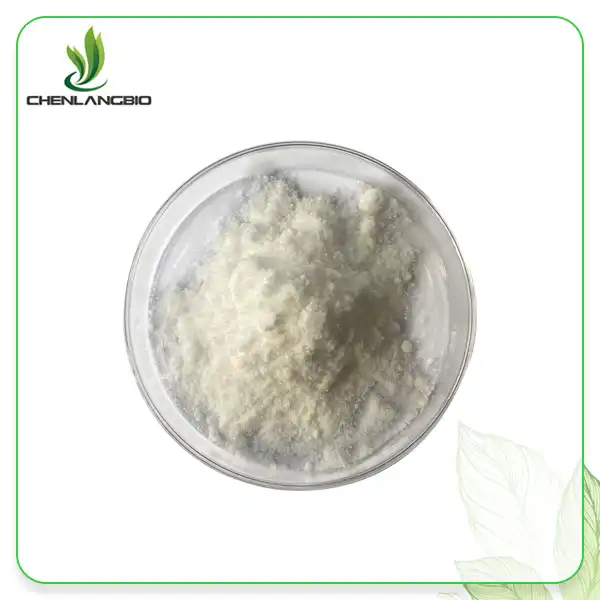What Are the Side Effects of Bakuchiol
2024-08-07 17:07:55
The plant Psoralea corylifolia produces a chemical called bakuchiol, which is a natural substitute for retinol in cosmetic products. Because of its mild nature and well-established anti-aging and anti-inflammatory qualities, buchuctone is recommended over retinol. But, like with any component in skincare products, it's important to know what might go wrong and how it could impact your skin. In this article, we talk about the safe usage of bebuchiol as well as its possible drawbacks.
Is Bakuchiol Safe for All Skin Types?
Is a novel skincare ingredient appropriate for every kind of skin? When it is presented, one of the first questions that come up is this one. Despite the fact that bakuchiol is usually praised for being gentle, it's crucial to understand how it could react with different skin types.
1. Effects on Sensitive Skin
Sensitive skin types may usually tolerate but respond differently to bebacchuchiol. Some people can feel a slight irritability, particularly if their skin is very reactive. It is best to do a patch test before to incorporating bakuchiol into your daily regimen in its entirety. To give your skin time to respond, start with a lesser concentration and gradually increase it.
2. Combination Skin Considerations
For those with combination skin, bakuchiol can be a versatile ingredient that balances the needs of both oily and dry areas. Its anti-inflammatory properties can help soothe redness and irritation, while its antioxidant benefits support overall skin health. However, users should monitor their skin's response, particularly if they are prone to breakouts in the oily zones.
3. Acne-Prone Skin
Bakuchiol is non-comedogenic, meaning it does not clog pores. This makes it a suitable option for acne-prone skin. Its anti-inflammatory properties can help reduce the severity of breakouts, and its antibacterial effects can assist in keeping acne-causing bacteria at bay. However, as with any new skincare ingredient, it is important to introduce bakuchiol gradually and observe any changes in your skin.
4. Dry Skin Benefits
Individuals with dry skin may find bakuchiol beneficial due to its ability to stimulate collagen production without causing dryness. It can help improve skin texture and reduce the appearance of fine lines. However, it is essential to pair bakuchiol with a good moisturizer to maintain optimal hydration levels.
5. Dermatologist Recommendations
Many dermatologists recommend bakuchiol for its gentle nature, particularly for those who cannot tolerate retinol. However, they advise starting with a lower concentration and increasing it gradually to monitor skin tolerance and avoid any potential side effects.
Does Bakuchiol Cause Irritation?
Understanding whether bakuchiol can cause irritation is essential for those with sensitive or reactive skin. While it is known for being gentler than retinol, individual reactions can still occur.
1. Initial Reactions
Some users may experience mild redness or irritation when first using bakuchiol. This is often temporary and subsides as the skin builds tolerance. To minimize irritation, it is recommended to start with a lower concentration and gradually increase usage.
2. Patch Testing
Conducting a patch test before full application can help identify any potential adverse reactions. Apply a small amount of bakuchiol to a discreet area of skin and wait 24 hours to see if any irritation occurs. This step is crucial for those with sensitive skin.
3. Combining with Other Ingredients
Bakuchiol can be used in conjunction with other skincare ingredients, but it is important to be mindful of potential interactions. Combining bakuchiol with other active ingredients, such as AHAs or BHAs, may increase the risk of irritation. It's advisable to introduce new products gradually and observe how your skin responds.
4. Soothing Ingredients
Pairing bakuchiol with soothing ingredients, such as hyaluronic acid or aloe vera, can help mitigate any potential irritation. These ingredients provide hydration and calming effects, supporting the skin barrier while using bakuchiol.
5. Long-Term Tolerance
Over time, most users find that their skin builds tolerance to bakuchiol, reducing the likelihood of irritation. Consistent use, combined with proper moisturizing and sun protection, can help maintain skin health and enhance the benefits of bakuchiol.
Can Bakuchiol Cause Allergic Reactions?
While allergic reactions to bakuchiol are rare, they can occur. Understanding the signs of an allergic reaction and how to address them is important for safe use.
1. Signs of an Allergic Reaction
Allergic reactions to bakuchiol may include redness, swelling, itching, or a rash. If you experience any of these symptoms after using bakuchiol, discontinue use immediately and consult a healthcare professional.
2. Allergy Testing
If you have a history of allergies or sensitive skin, it is advisable to perform an allergy test before incorporating bakuchiol into your skincare routine. Apply a small amount to the inner forearm and monitor for any signs of an allergic reaction over 48 hours.
3. Consulting a Dermatologist
If you are unsure about your skin’s reaction to bakuchiol or have a history of allergic reactions to skincare ingredients, consulting a dermatologist is recommended. They can provide personalized advice and suggest alternative products if necessary.
4. Natural Ingredient Caution
Bakuchiol is derived from the Psoralea corylifolia plant, which may contain other natural compounds that could trigger allergic reactions. It's important to choose high-quality, purified bakuchiol products to minimize the risk of allergens.
5. Emergency Response
In rare cases of severe allergic reactions, such as difficulty breathing or swelling of the face and throat, seek emergency medical attention immediately. While these reactions are uncommon, it is important to be aware of the signs and respond promptly.
How Does Bakuchiol Compare to Retinol in Terms of Side Effects?
Comparing bakuchiol to retinol, particularly regarding side effects, can help users make informed decisions about which ingredient is best suited for their skincare needs.
1. Retinol Side Effects
Retinol is known for its effectiveness in promoting cell turnover and reducing signs of aging. However, it can cause significant side effects, including dryness, peeling, redness, and increased sensitivity to sunlight. These side effects often require a period of adjustment and careful management.
2. Bakuchiol's Gentleness
Bakuchiol offers similar anti-aging benefits to retinol but with fewer side effects. It does not cause the same level of dryness or irritation, making it a preferable option for those with sensitive skin or those who cannot tolerate retinol.
3. Long-Term Use
Both bakuchiol and retinol can be effective for long-term use, but bakuchiol’s gentler nature makes it suitable for continuous use without the need for frequent breaks. This can lead to more consistent results over time.
4. Sun Sensitivity
Retinol increases the skin’s sensitivity to sunlight, necessitating diligent use of sunscreen. Bakuchiol, on the other hand, does not have this effect, allowing for more flexible use in both morning and evening routines.
5. User Preferences
Ultimately, the choice between bakuchiol and retinol depends on individual skin types and preferences. Those seeking powerful anti-aging effects without the risk of significant side effects may prefer bakuchiol, while others who can tolerate retinol’s side effects may benefit from its more intensive action.
How to Minimize Side Effects When Using Bakuchiol?
Minimizing side effects when using bakuchiol involves proper application techniques and supporting skincare practices.
1. Start Slowly
Introduce bakuchiol gradually into your routine. Begin with a lower concentration and use it every other day to allow your skin to adjust. Increase frequency as your skin builds tolerance.
2. Pair with Moisturizers
To maintain moisture and fortify the skin's barrier, use a premium moisturizer.Seek for products that contain hyaluronic acid, ceramides, glycerin, or other hydrating ingredients.This information appears overly automated.
In this material, it appears overly robotic.
3. Avoid Harsh Ingredients
It is not recommended to use Bauchuchiol in conjunction with any other products that could irritate the skin, such as potent exfoliants or concentrations of AHA and BHA.This content looks too roboticThis ensures that bakuchiol will not cause any adverse effects while still providing its benefits and reduces the likelihood of discomfort.
4. Sun Protection
Even though bakuchiol does not increase sun sensitivity, using sunscreen is crucial for overall skin health. Protecting your skin from UV damage enhances the effectiveness of your skincare routine and prevents potential irritation from sun exposure.
5. Listen to Your Skin
Pay attention to how your skin responds to bakuchiol. If you notice any signs of irritation or discomfort, adjust the frequency of use or consult a dermatologist for personalized advice.
Conclusion
A great component for skincare, bakuchiol has numerous advantages to retinol without any of the negative side effects. Even though it's usually well accepted, it's still crucial to introduce it gradually and keep an eye on how your skin responds. You may get the advantages of bakuchiol with less chance of negative effects if you use it correctly and nourish your skin with moisturizing and calming nutrients. For further individualized guidance or product suggestions, send an email to admin@chenlangbio.com.
References
Healthline | What Is Bakuchiol and Should You Use It in Your Skin-Care Routine?
Dermstore | Bakuchiol: The Natural Alternative to Retinol.
Harper’s Bazaar | Bakuchiol: The Plant-Based Retinol Alternative.
Byrdie | Everything You Need to Know About Bakuchiol.
Allure | Bakuchiol Is the New Retinol Alternative.
The Dermatology Review | Bakuchiol Benefits for Skin.
Good Housekeeping | Bakuchiol vs. Retinol: What’s the Difference?
Send Inquiry
Related Industry Knowledge
- How to Eat Phellinus Linteus?
- The Science Behind Bulk Dimethylmethoxy Chromanol
- What is Water Soluble Coenzyme Q10
- What are the Health Benefits of Tetrahydrocurcumin
- Are Bergenia Poisonous to Dogs
- What is Ectoin in Skincare
- What is Pure Cinnamon Bark Extract
- Why We Love Pure Natural Quercetin
- Urolithin A Benefits and Side Effects
- What Does Madecassoside Do for Skin






_1728886308482.webp)




